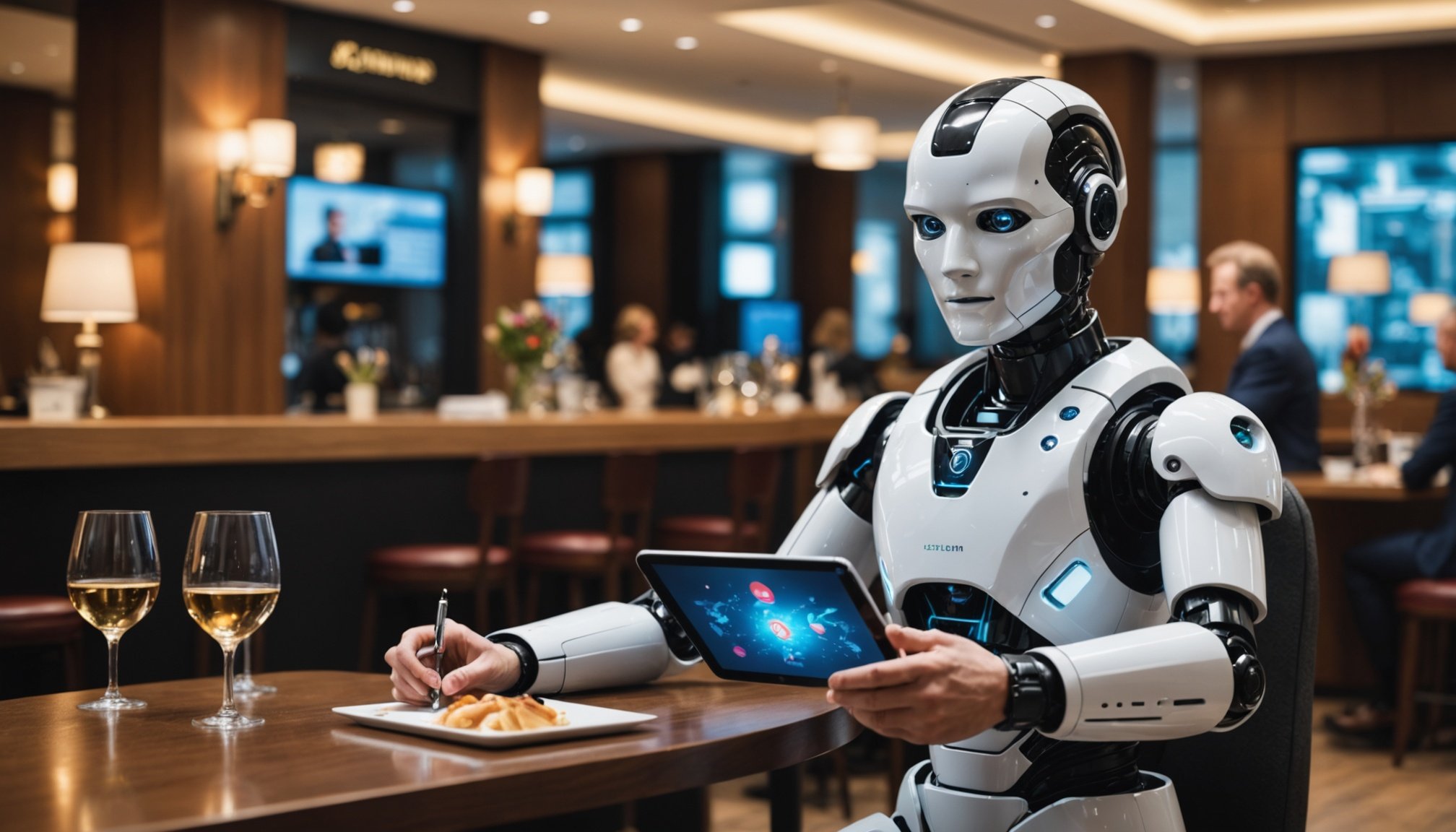The hospitality industry in the UK is transforming. Artificial Intelligence (AI) is enhancing customer experiences in ways previously unimagined. From personalized recommendations to streamlined service processes, AI empowers businesses to anticipate guest needs and create memorable interactions. With competition intensifying, understanding AI's role becomes essential for hospitality professionals looking to elevate service quality. Explore how these innovative technologies redefine customer engagement, driving satisfaction and loyalty in a rapidly evolving market.
The Impact of AI on Customer Experience in UK Hospitality
Exploring how AI reshapes the hospitality sector and enhances customer interactions.
In parallel : Unlocking Efficiency: Strategies for UK Food Delivery Services to Streamline Their Logistics
Challenges in the UK Hospitality Sector
The customer experience in the UK hospitality industry faces several challenges, including high expectations for personalized service and the need for efficiency. With increasing competition, businesses struggle to maintain consistency and deliver exceptional service. These challenges are further compounded by fluctuating demand and staffing issues, making it essential for the sector to seek innovative solutions.
AI Applications in Customer Service
AI technologies are being deployed to address these challenges, offering significant improvements in customer service. From chatbots handling inquiries to AI-driven analytics predicting customer preferences, the integration of AI is transforming operations. For instance, automated check-ins and personalized recommendations are becoming commonplace, enhancing the overall customer experience.
In the same genre : Explore ecofriendly, organic treasures at upcycle luxe
Benefits of AI Integration
Integrating AI into hospitality operations offers numerous benefits:
- Enhanced Efficiency: Automating routine tasks allows staff to focus on personalized service.
- Data-Driven Insights: AI analyzes customer data to provide actionable insights, improving service delivery.
- Consistency and Accuracy: AI systems ensure consistent and accurate customer interactions, reducing human error.
The adoption of AI in the UK hospitality sector is not just a trend but a necessity for staying competitive. By leveraging AI, businesses can overcome existing challenges and elevate the customer experience to new heights.
Personalization Through AI: Meeting Customer Expectations
Exploring how AI-driven personalization elevates customer experiences in hospitality.
The Importance of Personalization in Hospitality
In the competitive landscape of the UK hospitality sector, personalization has become a critical factor in meeting and exceeding customer expectations. Guests now anticipate tailored experiences that cater to their individual preferences, enhancing their overall satisfaction and loyalty. AI personalization plays a pivotal role in achieving this by leveraging sophisticated algorithms to deliver bespoke services.
AI Analyzes Customer Data for Personalized Experiences
AI systems excel in analyzing vast amounts of customer data to uncover patterns and insights that human analysis might miss. By doing so, these systems can predict and tailor experiences to individual preferences. For instance, AI can suggest personalized dining options based on past orders or recommend activities that align with a guest's interests. This level of customization not only enhances the customer experience but also fosters a deeper connection between the guest and the hospitality provider.
Examples of Successful Personalization Strategies Using AI
Several businesses have successfully implemented AI-driven personalization strategies:
- Custom Room Settings: Hotels use AI to adjust room settings like lighting and temperature based on previous guest preferences.
- Tailored Communication: AI chatbots provide personalized greetings and responses, making interactions feel more human-like and engaging.
- Predictive Offers: AI analyzes booking patterns to offer special deals and packages that align with a guest's travel history.
By integrating these strategies, hospitality providers can significantly improve customer satisfaction and loyalty, setting new standards in the industry.
Case Studies: Successful AI Implementations in Hospitality
Exploring real-world examples of AI integration in the hospitality sector.
High-Profile Hotel Implementations
Luxury hotels are at the forefront of adopting AI tools, transforming guest experiences and operational efficiency. For instance, several high-end UK hotels utilize AI-driven concierge services that handle guest inquiries and provide personalized recommendations. This not only enhances convenience but also boosts customer satisfaction metrics. A notable example includes AI systems that analyze guest feedback to continuously improve service delivery, ensuring a tailored experience for each visitor.
Innovative Restaurant Technologies
Restaurants are leveraging AI for menu customization and order recommendations, significantly impacting operational efficiency. AI systems analyze customer preferences to suggest dishes, optimizing the dining experience. This technology helps manage kitchen inventory and reduce waste, contributing to a smoother operation. As a result, restaurants report increased customer satisfaction due to faster service and personalized dining options.
Small Business Successes
Small hotels and restaurants are also reaping the benefits of AI. By implementing AI solutions, these businesses have achieved impressive outcomes, such as improved guest engagement and streamlined operations. One small hotel chain uses AI to predict guest needs based on previous stays, enhancing the personalized experience. Lessons learned from these case studies highlight the importance of integrating AI to stay competitive in the hospitality industry.
- Key Outcomes:
- Enhanced operational efficiency
- Improved customer engagement
- Increased loyalty and repeat visits
These hospitality success stories demonstrate the transformative power of AI, providing valuable insights for other businesses aiming to enhance their services and customer interactions.
Best Practices for Implementing AI in Hospitality
Understanding the intricacies of AI implementation is vital for hospitality businesses aiming to enhance their operations.
Key Considerations for Choosing AI Tools
Selecting the right AI tools is crucial for successful integration in the hospitality sector. Businesses must evaluate their specific needs and objectives, ensuring the chosen technology aligns with their operational goals. Consider factors such as scalability, ease of integration, and the ability to provide actionable insights. A thorough assessment will help in identifying tools that can seamlessly fit into existing systems, thereby maximizing benefits.
Integration of AI with Existing Systems and Processes
The seamless integration of AI with existing systems is essential for optimizing performance and ensuring minimal disruption. Effective strategies include conducting a comprehensive audit of current processes and identifying areas where AI can add value. A phased approach to implementation can mitigate risks and allow for adjustments as needed. By aligning AI capabilities with existing workflows, businesses can enhance efficiency and deliver a superior customer experience.
Training Staff to Utilize AI Effectively
Staff training is a critical component of successful AI implementation in hospitality. Employees must be equipped with the necessary skills to operate AI systems efficiently. Regular training sessions and workshops can help staff understand AI functionalities and their applications in daily operations. Encouraging a culture of continuous learning will empower employees to harness AI tools effectively, leading to improved service delivery and customer satisfaction.
- Key Steps for Staff Training:
- Conduct initial assessments of current skill levels
- Develop tailored training programs
- Offer ongoing support and resources
- Encourage feedback and iterative learning
By focusing on these best practices, hospitality businesses can ensure a smooth transition to AI-enhanced operations, ultimately boosting their competitive edge in the industry.
Challenges and Considerations in AI Adoption
Navigating the complexities of integrating AI into the hospitality sector.
Common Barriers to AI Adoption
The hospitality sector encounters several obstacles when integrating AI technologies. One significant challenge is the initial cost of implementation, which can be prohibitive for smaller businesses. Additionally, the complexity of technology adoption requires substantial time and resources to ensure seamless integration with existing systems. Resistance to change among staff is another barrier, as employees may be wary of AI replacing human jobs, leading to hesitancy in embracing new tools.
Ethical Considerations in Using AI for Customer Interactions
Ethical concerns are paramount in the use of AI for customer interactions. Ensuring privacy and data protection is critical, as AI systems often handle sensitive customer information. There is also the risk of bias in AI algorithms, which can lead to unfair treatment of certain customer groups. Hospitality businesses must prioritize transparency and fairness in their AI applications to maintain trust and uphold ethical standards.
Future Trends and Potential Obstacles in AI Technology
Looking ahead, the future trends in AI technology present both opportunities and challenges for the hospitality sector. The increasing sophistication of AI tools promises enhanced personalization and operational efficiency. However, potential obstacles such as regulatory changes and the need for continuous updates to AI systems pose ongoing challenges. Businesses must stay informed and adaptable to navigate these evolving landscapes effectively.
- Key Considerations for AI Adoption:
- Initial cost and resource allocation
- Staff training and resistance management
- Ensuring ethical use and data protection
By addressing these challenges and considerations, hospitality businesses can better position themselves to harness the full potential of AI, ensuring sustainable growth and improved customer experience.
The Future of AI in UK Hospitality
Exploring the evolving landscape of AI in hospitality and its impact on customer experiences.
Predictions for AI Advancements in Hospitality
The future of AI in the UK hospitality sector promises transformative changes, with advancements poised to revolutionize customer experiences. Experts predict that AI will become more intuitive, enabling systems to anticipate guest needs with unprecedented accuracy. This evolution is expected to streamline operations further, providing a seamless and personalized experience for every visitor.
The Role of AI in Shaping Future Customer Expectations
As AI technologies continue to evolve, they will play a crucial role in shaping future customer expectations. Guests will increasingly expect AI-driven services that offer convenience and personalization. For instance, AI could enable real-time adjustments to services based on guest feedback, ensuring satisfaction. This shift will require hospitality businesses to adapt quickly to meet these heightened expectations.
Emerging Technologies to Watch in the Hospitality Sector
Several emerging technologies are set to impact the hospitality industry significantly. Innovations such as AI-powered virtual reality tours and augmented reality experiences are on the horizon, offering guests immersive interactions with their surroundings. These technologies promise to enhance the customer experience, providing new ways to engage and interact.
- Key Technologies:
- AI-driven virtual assistants
- Augmented reality for enhanced experiences
- Predictive analytics for personalized services
These emerging trends highlight the importance of staying abreast of technological advancements to remain competitive. The future of AI in hospitality is not only about enhancing operational efficiency but also about redefining how guests experience and interact with services.











